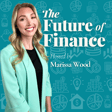
Millennial Money Truths: Budgeting, Retirement & Real Talk with 35 Year-Old Client
- In this powerful and relatable episode of The Future of Finance, Marissa Wood sits down with client and fellow millennial Jeremy Hicks to unpack the unique financial challenges—and opportunities—facing today’s 30-somethings.
They dive into real-world budgeting strategies, navigating rising expenses, building wealth while raising a family, and how small consistent investing can create generational impact. If you're a millennial wondering, “Am I going to be able to retire?”—this episode is for you.
💬 Featuring candid conversation, emotional honesty, and actionable advice on how to thrive financially—even when the odds feel stacked against you.
⏱ Timestamps:
0:00 – Intro: Why Millennials Need a Different Financial Strategy
1:30 – Real Talk: Why “Just Do What Your Parents Did” Doesn’t Work Anymore
3:15 – The Millennial Home Ownership Gap & Jeremy’s Early Win
5:00 – Visualizing Retirement with a Future Cash Flow Analyzer
6:30 – What Are You Really Spending? Tools & Truths About Budgeting
8:00 – Inflation Reality: Why Your $8K Monthly Budget Will Cost $20K Later
9:35 – Job Hopping, Salary Stagnation & Forgotten 401(k)s
11:15 – What’s the Difference Between a 401(k) & an IRA?
14:00 – The Forgotten 401(k) Fix: Step-by-Step Rollover Help
16:00 – How Small Adjustments Can Add 5+ Years to Your Retirement
18:15 – The YOLO Trap vs. Leaving a Legacy for Your Kids
21:00 – The $500 Plan: Dividing Monthly Savings by Time Horizons
23:00 – Why Financial Advisors Aren’t Just for the Wealthy
25:00 – Clarity from Planning: Turning “I Hope” Into “We Have a Plan”
26:45 – Jeremy’s Best & Worst Financial Decisions (Spoiler: Solar Panels)
31:15 – Refinance Tips: For Both Real Estate & Investments
33:00 – Final Advice for Millennials: Budget, Emergency Fund, and Start Now
36:30 – Life Insurance as Legacy Planning for Future Generations
39:00 – Closing: The Mindset Shift from Me to We
🔗 Ready to take the first step?
Visit https://www.union-financial.com/ to schedule a free consultation.
💬 If this episode moved you or gave you a new perspective, please like, comment, and share it with someone who needs to hear this.
